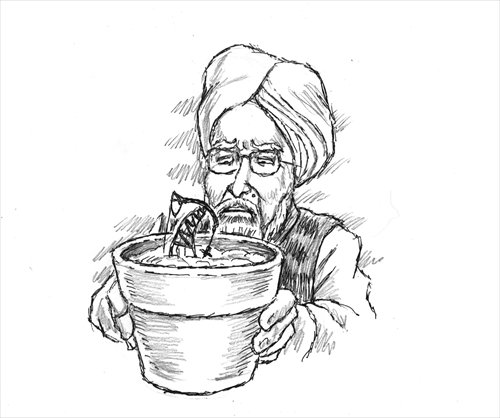HOME >> OP-ED
Cooperation, not confrontation better choice for India in Central Asian energy
By Liu Qian Source:Global Times Published: 2013-11-5 20:48:01

Illustration: Peter C. Espina/GT
Central Asia is rich in oil and gas. China and India, with growing energy consumption, both need to participate in the region's energy exploration. As a result, the two have begun to compete in the region.
Compared with Western energy companies, Chinese companies were latecomers in entering Central Asia's oil and gas sector.
After the dissolution of the Soviet Union, the US aimed to fill the vacuum in the region in hopes of weakening Russia's influence, and exploring oil and gas and building pipelines became its priorities. This was in line with Central Asian countries' own needs, and paved the way for the arrival of Western companies in the region.
This is particularly the case in Kazakhstan. Companies like ExxonMobil and Chevron have obtained the country's best oil and gas resources. British oil company BP has turned its development focus to Azerbaijan, which borders the Caspian Sea.
China was an onlooker in Central Asia for quite a long time before developing local relations, and Russia was one of the main reasons.
During the process of establishing the Shanghai Cooperation Organization and cooperating with Russia and Central Asia in anti-terrorist and anti-separatism efforts, China has gradually gained momentum in energy cooperation with Central Asia and has made impressive progress.
India began exploring the energy potential of the region even later than China. While there are some efforts at cooperation, India barely has any presence at the moment.
But some aggressive Indian media outlets believe India can directly challenge China in the region, basing this claim on a potential 8.4 percent Indian stake in Kashagan, a Kazakh oil company, and the recent plans for two pipelines from Turkmenistan to China and India.
The US firm ConocoPhilips used to hold 8.4 percent of Kashagan's stake. As it readjusted its strategies, ConocoPhilips reached an agreement with India's Oil & Natural Gas Corp (ONGC), and brought the agreement to the Kazakh government for approval.
However, the stake was bought by Kazakhstan's national company KazMunayGas which owns the priority purchase rights, and was then transferred to China National Petroleum Corporation (CNPC) with the approval of the Kazakh government. This made India feel aggrieved, believing China took away what it was supposed to get.
Actually, there is nothing inappropriate in this open deal, which obeyed Kazakh rules. And China can bring more benefits to the project including large amounts of investment and a stable market.
After India's purchase failed, even Indian Prime Minister Manmohan Singh said India should have done better at developing ties with the Kazakh government.
This reflects the discrepancies of a green hand and old hand in the exercise of market rules. The CNPC gained its experience through strenuous efforts.
As for the competition between the China-Central Asia natural gas pipeline and the Turkmenistan-Afghanistan-Pakistan-India (TAPI) natural gas pipeline, it does exist, but not in the tense contradiction that the Indian media portrays.
Currently, the China-Central Asia natural gas pipeline has a stable supply and has been expanded. In the future, it can provide as much as 65 billion cubic meters annually. Besides, the regions it passes through have relatively stable security, and the buildup and operation of the pipeline can thus be ensured.
By contrast, the TAPI pipeline is still in its initial stage, and the biggest threats come from the Afghan situation and India-Pakistan relations. India needs to deal with both issues cautiously which is a huge task.
Due to its geopolitical disadvantages and the current oil and gas exploration in Central Asia, India can hardly enter this field as an independent investor. A wise choice would be to cooperate with the West, Russia or China.
Judging from energy policies in both China and India, New Delhi should seek mutual benefits with China, rather than attempting to challenge the more experienced power in this region.
The author is an assistant research fellow at the Academy of Chinese Energy Strategy with the China University of Petroleum, Beijing. opinion@globaltimes.com.cn
Posted in: Viewpoint